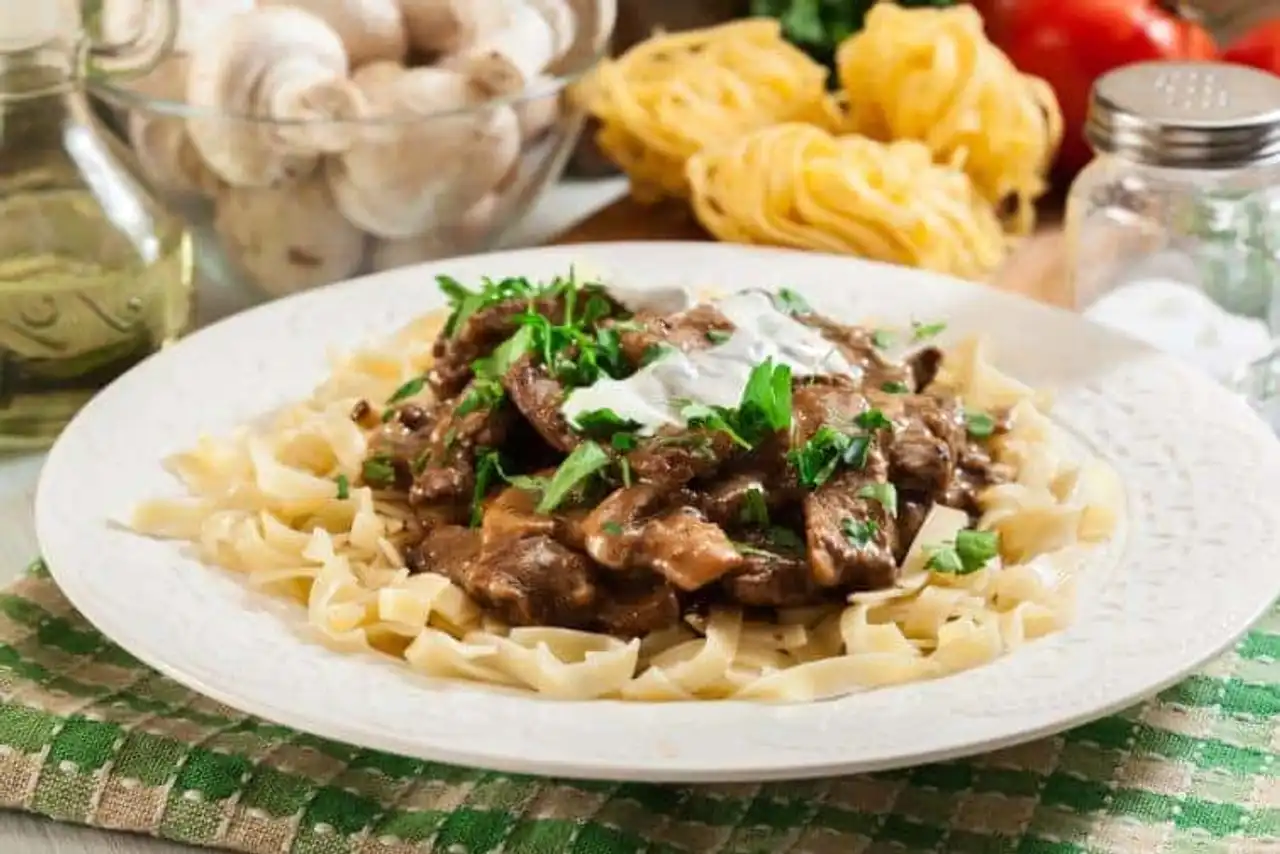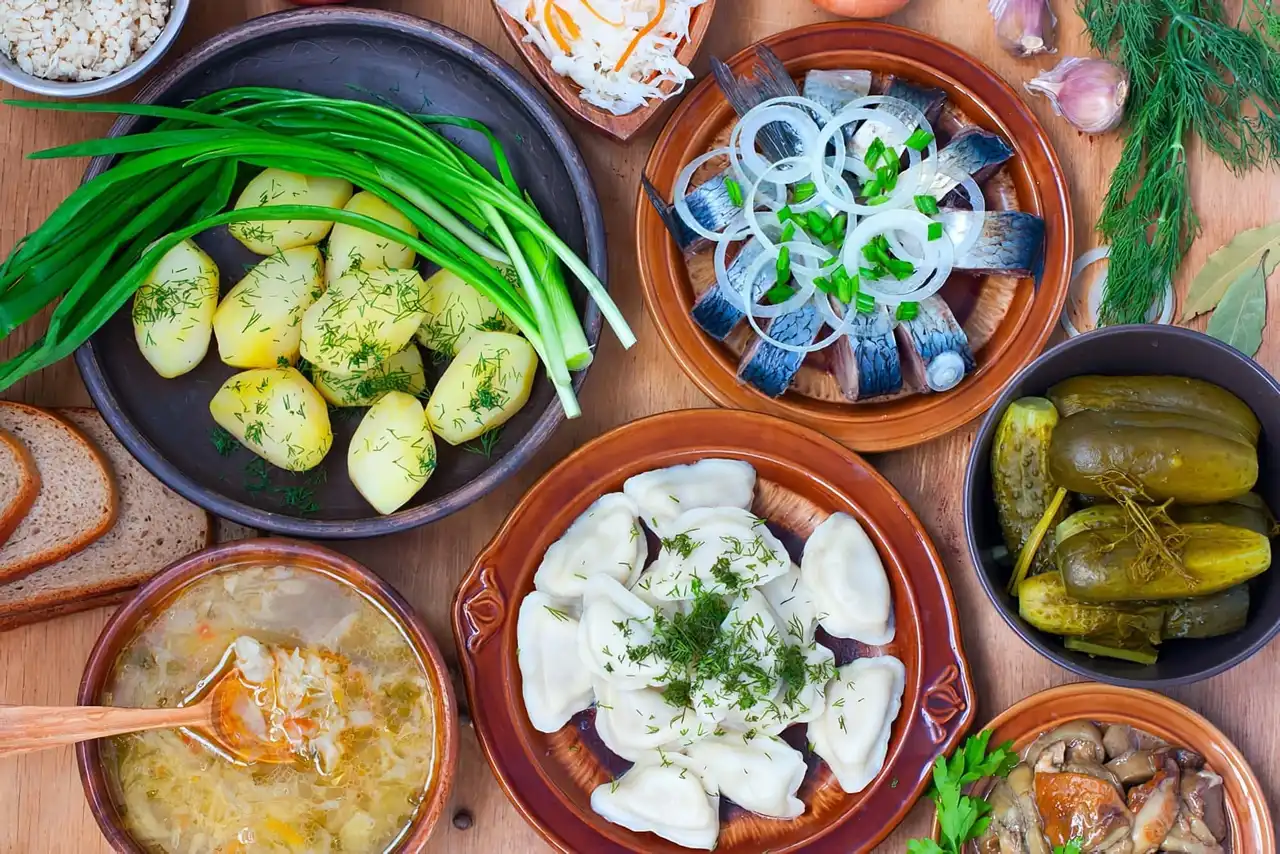Caviar, borshtch, blinis, vatrouchka, vodka... Here are the best Russian specialties to enjoy the time of a Slavic holiday!
Russia, a country so vast and at the same time so difficult to discover in its entirety. Then we think of the richness and diversity of landscapes, all as magical and breathtaking as others, such as Siberia and its snowy plains, Moscow and its colorful churches, the Baltic Sea or St. Petersburg , nicknamed Venice of the North .
However, we often forget the Russian gastronomy seen as unfinished. Apart from vodka and caviar, many people do not know what the Slavic cuisine hides. This ignorance is now over, because Russian specialties deserve their place at our tables! Typical, simple, tasty and rich, Russian cuisine has not finished talking about it.
Do you have water in your mouth? Perfect, let’s take a look at the Russian specialities to be discovered during your stay. Trust the Chief!
Zakouski (Entry)

Photo credit: Shutterstock / comeirrez
The term zakouski means out of work. It can be two things: either amuses-gails served at the aperitif, or entrances served before the resistance dish. Russians, like Armenians or ashkenazes, are groaning. Here are some of the entries you can find at the table:
Vegetarian entries
- Oladi: famous Russian pancakes, they usually serve as accompaniment or tartines. It includes butter or caviar, but you can also put jam or sugar in it. In short, the oladis can eat both in and out of dessert.
- Vegetables malossol : This is a method of preparation that promotes food conservation. Russians are enthusiasts of this technique that they use in particular for ogourtsi (big pickles) In summary, it’s a kind of marinade that is raised and spicy that gives food a special taste.
- mushroom salad: Everything is in his name! The mushroom is one of the basic products in Russia, which is why we find it in many dishes. It eats as hot as cold, raw as cooked, salad or stuffed. In short: you have the embarrassment of choice!
Other entries
- Caviar: How can we talk about Russian specialties by omitting caviar? Russians like to start their dinner with this type of food. However, don’t get me wrong, they eat all kinds of caviar, both sturgeon eggs and vegetables (inbergine or zucchini).
- Selyodka pod cabbage (flag): traditional holiday dish at the end of the year. So don’t worry about this Russian specialty is not based on herring and hair! It is simply a salad composed of salted herring and cut into dice, served under a coat red, boiled beets, accompanied by hard eggs, onions and other grated vegetables (potatoes and carrots) as well as mayonnaise.
- " Olivier" Salad: A big party dish too, the Olivier salad is mainly served in the New Year. Invented by Chef Lucien Olivier in the 1860s, she has for many years entered Russian culinary traditions. Composed of vegetables and associated with various foods, it has the particularity of being related to mayonnaise. If we have chosen to integrate the Olivier salad into the entrances, it is often served out of work during the holidays.
- Pierojki : as well as vareniki, the booths are Russian specialties! Incontournable, pierojkis consist of meat, onions, potatoes, mushrooms, eggs and cheese. Very popular in Russia, they use themselves as an entry although they are fairly consistent.
Vtoroé (The dish)

Photo credit: Shutterstock / Slawomir Fajer
After this mouthing, it's time to go to resistance dishes! The Russians are big eaters and we feel it in their dishes -often in sauce- and mixing as well meats as feculents and vegetables. Here is a small overview of some Russian specialties to taste as soon as possible!
Soups
- Borshtch: Russian speciality known worldwide, this soup is one of the favorite dishes of Russians. At beet with meat and full of other vegetables, this dish is a treat! Do not rely on its appearance, and dip your spoon into your bowl: you will thank us!
- Solianka: soups have an important place in the Slavic meals and often serve as a resistance dish. Based on the broth of meat, cabbage, pickles, tomatoes, capers, lemon and mushrooms, this soup will hold you for the day!
- Chtchi: This thick soup is one of Russia’s culinary traditions, which is very widespread in the Eastern countries. It consists of cabbage, meat and spices.
Meat-based dishes
- Goloubtsy: as many meals in Russia, it is based on cabbage. To make it simple, it is meatballs wrapped with cabbage leaves. In addition, rice is added to stuffing. It is a rather heavy dish to digest, so plan a little time for a nap.
- Boeuf Stroganov : probably the Russian recipe with the most history. Invented in the 17th century by the French cook of the Count Pavel Stroganoff, This dish, made with fine honeycombs, is accompanied by thick cream, paprika, onions and mushrooms. This very simple recipe has become a must for Russian specialties. Indeed, you can prepare your Stroganov beef in your kitchen, as well as enjoy it in the restaurant. Simple, tasted, loved by all, he wins all the votes.
- Chachlik: typical of the Slavic countries, this Russian specialty looks like a kebab skewer. The most famous recipe is the marinated sheep skewer cooked on wood fire. However, you can choose other meats. Like a barbecue, it is a summer dish that can be accompanied by crudities or feces. For the anecdote, in the Caucasus, the daghestanais sheep used to make the skewers can only be cooked by men.
Fish-based dishes
- Stroganina: Even in the North, fish is eaten, but it is a whole concept. If temperatures are freezing, Russians are not afraid to eat cold. Stroganina is a way to cut the fish. You take any local fish: omoul, sturgeon, muksun, knight omble, white coregone, Siberian salmon, and cut it into thin slices, then you season it with salt and pepper. Here it is!
- The splash: how to make a top of the Russian specialties without talking about the smear? This is the most fish caught in the Neva! If you shovel fish, go to St. Petersburg in the spring. Indeed, the city organizes a festival of perennial that brings together all the inhabitants who love old traditions.
Desserte (The dessert)

Photo credit: Shutterstock / Nailya Yakubova
A dream of salty dishes, it's time to go to sweet. And be without fear, the Russians shudder for desserts: this is proof!
The cakes and pies
- Vatrouchka: This cake looks like cheesecake. Indeed, vatrouchka is a kind of brioche filled with tvorog (pressed fresh cheese). This typical dessert from Russia, flavored with lemon or vanilla, is enriched with jam or honey. We recommend this Russian specialty.
- Smetannik: It’s our favourite of sweet Russian specialties. This cream and jam pie is ultra soft and tasty! Just like the Russians, we're swept away!
Other desserts
- Toula’s Prianik (spice bread): It is a must of Russian specialties! If you have to bring back a souvenir of your trip to your loved ones, bring this gingerbread. Delicious, it is kilted with jam or concentrated milk.
- Syrniki: As you will have understood through this classification, Russians are lovers of pancakes. Syrnikis are small cakes between pancakes and doughnuts. They are made from fresh cheese, flour, eggs and sugar. For tasting, we recommend that you accompany them with jam or honey. It should be noted that one of the Russian specialties is Altai honey (West Siberia). So you will have a traditional dessert from A to Z.
- Tchak-Tchak: You're going to succumb to this sweetie, believe us! It is a paste cut into sticks, fried with oil, and arranged in dome to be covered with a burning honey syrup. This candy, though difficult to eat (tooth neck), is a treat.
Za zdrovia! (Health!)

Photo credit: Shutterstock / Oleksandra Naumenko
We couldn't make a ranking of Russian specialties without making an apartement on drinks. The reputation of Russians advances! Indeed, lovers of alcoholic beverages with a high degree, Russians like to party and trinquate to everything! Of course, vodka is the most famous specialty, but let us make you discover the other typical drinks of Russia!
Alcoholic beverages
- Vodka: popular in France, we will not teach you much. Vodka is a 40-degree life water. In Russia, vodka usually drinks with zakouskis.
- Beer: Like vodka, Russian beer is a product known in France. In Russia, some beers like Baltika win to be known. Around your pint, you will create friendly and friendly memories. For the anecdote, beer was not considered an alcoholic beverage before 2011 in Russia.
- Sbitene: It is a hot served hydromel, whose Russians are particularly fond of in winter. For even more traditions, the sbitten can be preserved in a samovar ( Typical Russian metal beam).
You now know Russian specialties! Priatnovo apetita !








Loading comments ...